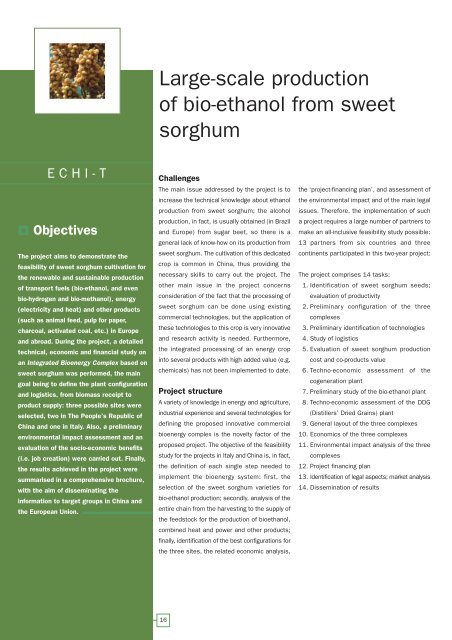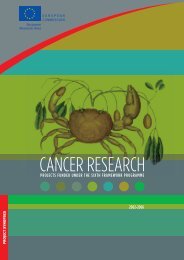European Bio-Energy Projects
European Bio-Energy Projects
European Bio-Energy Projects
Create successful ePaper yourself
Turn your PDF publications into a flip-book with our unique Google optimized e-Paper software.
ECHI-T Challenges<br />
Objectives<br />
The project aims to demonstrate the<br />
feasibility of sweet sorghum cultivation for<br />
the renewable and sustainable production<br />
of transport fuels (bio-ethanol, and even<br />
bio-hydrogen and bio-methanol), energy<br />
(electricity and heat) and other products<br />
(such as animal feed, pulp for paper,<br />
charcoal, activated coal, etc.) in Europe<br />
and abroad. During the project, a detailed<br />
technical, economic and financial study on<br />
an Integrated <strong>Bio</strong>energy Complex based on<br />
sweet sorghum was performed, the main<br />
goal being to define the plant configuration<br />
and logistics, from biomass receipt to<br />
product supply: three possible sites were<br />
selected, two in The People’s Republic of<br />
China and one in Italy. Also, a preliminary<br />
environmental impact assessment and an<br />
evaluation of the socio-economic benefits<br />
(i.e. job creation) were carried out. Finally,<br />
the results achieved in the project were<br />
summarised in a comprehensive brochure,<br />
with the aim of disseminating the<br />
information to target groups in China and<br />
the <strong>European</strong> Union.<br />
Large-scale production<br />
of bio-ethanol from sweet<br />
sorghum<br />
The main issue addressed by the project is to<br />
increase the technical knowledge about ethanol<br />
production from sweet sorghum; the alcohol<br />
production, in fact, is usually obtained (in Brazil<br />
and Europe) from sugar beet, so there is a<br />
general lack of know-how on its production from<br />
sweet sorghum. The cultivation of this dedicated<br />
crop is common in China, thus providing the<br />
necessary skills to carry out the project. The<br />
other main issue in the project concerns<br />
consideration of the fact that the processing of<br />
sweet sorghum can be done using existing<br />
commercial technologies, but the application of<br />
these technologies to this crop is very innovative<br />
and research activity is needed. Furthermore,<br />
the integrated processing of an energy crop<br />
into several products with high added value (e.g.<br />
chemicals) has not been implemented to date.<br />
Project structure<br />
A variety of knowledge in energy and agriculture,<br />
industrial experience and several technologies for<br />
defining the proposed innovative commercial<br />
bioenergy complex is the novelty factor of the<br />
proposed project. The objective of the feasibility<br />
study for the projects in Italy and China is, in fact,<br />
the definition of each single step needed to<br />
implement the bioenergy system: first, the<br />
selection of the sweet sorghum varieties for<br />
bio-ethanol production; secondly, analysis of the<br />
entire chain from the harvesting to the supply of<br />
the feedstock for the production of bioethanol,<br />
combined heat and power and other products;<br />
finally, identification of the best configurations for<br />
the three sites, the related economic analysis,<br />
16<br />
the ‘project-financing plan’, and assessment of<br />
the environmental impact and of the main legal<br />
issues. Therefore, the implementation of such<br />
a project requires a large number of partners to<br />
make an all-inclusive feasibility study possible:<br />
13 partners from six countries and three<br />
continents participated in this two-year project:<br />
The project comprises 14 tasks:<br />
1. Identification of sweet sorghum seeds;<br />
evaluation of productivity<br />
2. Preliminary configuration of the three<br />
complexes<br />
3. Preliminary identification of technologies<br />
4. Study of logistics<br />
5. Evaluation of sweet sorghum production<br />
cost and co-products value<br />
6. Techno-economic assessment of the<br />
cogeneration plant<br />
7. Preliminary study of the bio-ethanol plant<br />
8. Techno-economic assessment of the DDG<br />
(Distillers’ Dried Grains) plant<br />
9. General layout of the three complexes<br />
10. Economics of the three complexes<br />
11. Environmental impact analysis of the three<br />
complexes<br />
12. Project financing plan<br />
13. Identification of legal aspects; market analysis<br />
14. Dissemination of results

















